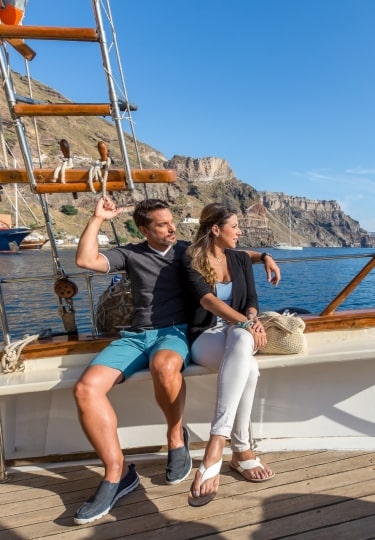If you’re visiting Greece for the first time, you’re in for a treat. The cradle of democracy offers everything from awe-inspiring ancient history to the trendy, modern neighborhoods of Athens and Thessaloniki—and plenty in between.
Whether you’re basking on a sun-soaked beach, soaking up big city energy, or cozying up by the fire in a remote mountain village, Greece is a feast for the senses—slow and relaxed one moment, vibrant and lively the next.
With so much to explore, planning ahead will help you make the most of your trip on your first visit to this most incredible of countries.
Greece Is a Year-Round Destination
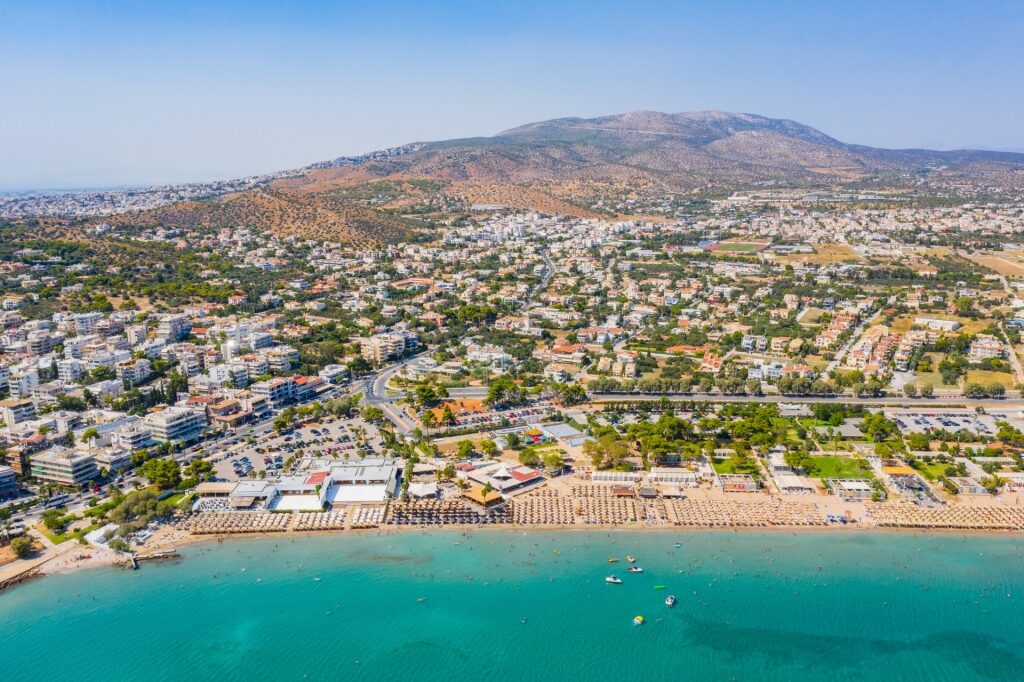
Athens
Greece in summer is amazing. The blazing sun and sparkling Mediterranean draw visitors to the islands like bees to honey. The flip side of that is that it can be quite crowded, so if you’re visiting Greece for the first time, it can pay dividends to travel at other times of the year.
Try the shoulder seasons of spring and fall as a starting point. The weather starts to heat up in mid-February and doesn’t really cool down again until the middle of October, so there’s plenty of scope for sea and sun without the crowds.
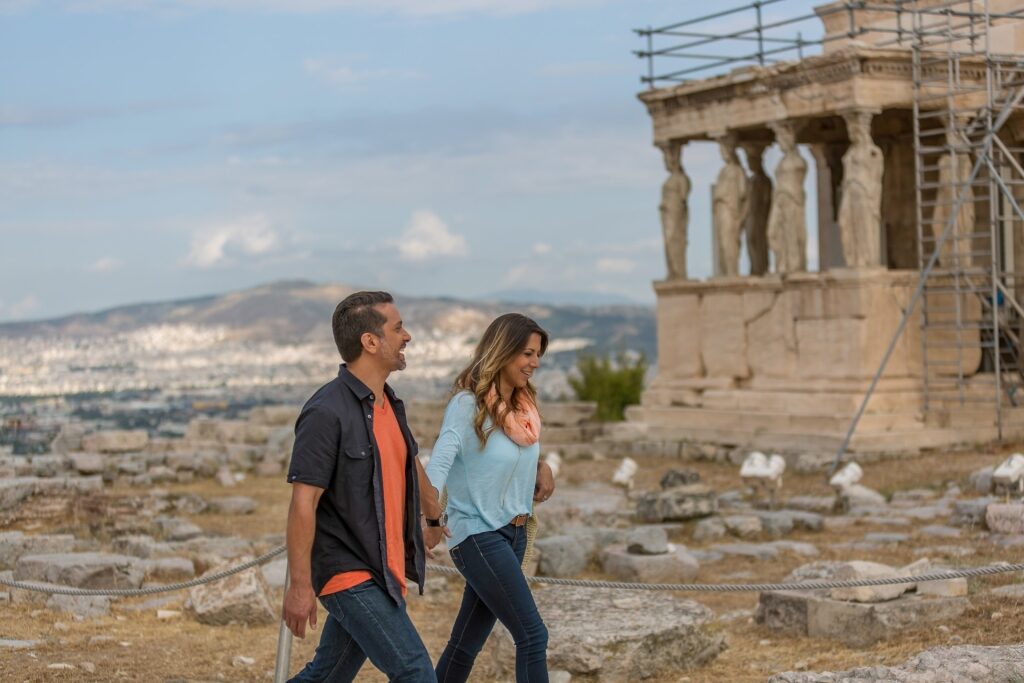
Acropolis, Athens
In big cities like Athens and Thessaloniki, museums and ancient sites are similarly less busy, and getting tables in high-end restaurants may be easier.
Over the past few years, the local tourism authorities have also promoted Greece as a winter destination. There are some delightful villages to explore on mountains such as Pelion, outside Volos.
The weather is usually crisp rather than cold and it’s a great opportunity to sit by a roaring fire with a glass of ouzo, the local aniseed spirit, and take in the atmosphere.
There’s Life Beyond Athens & the Islands
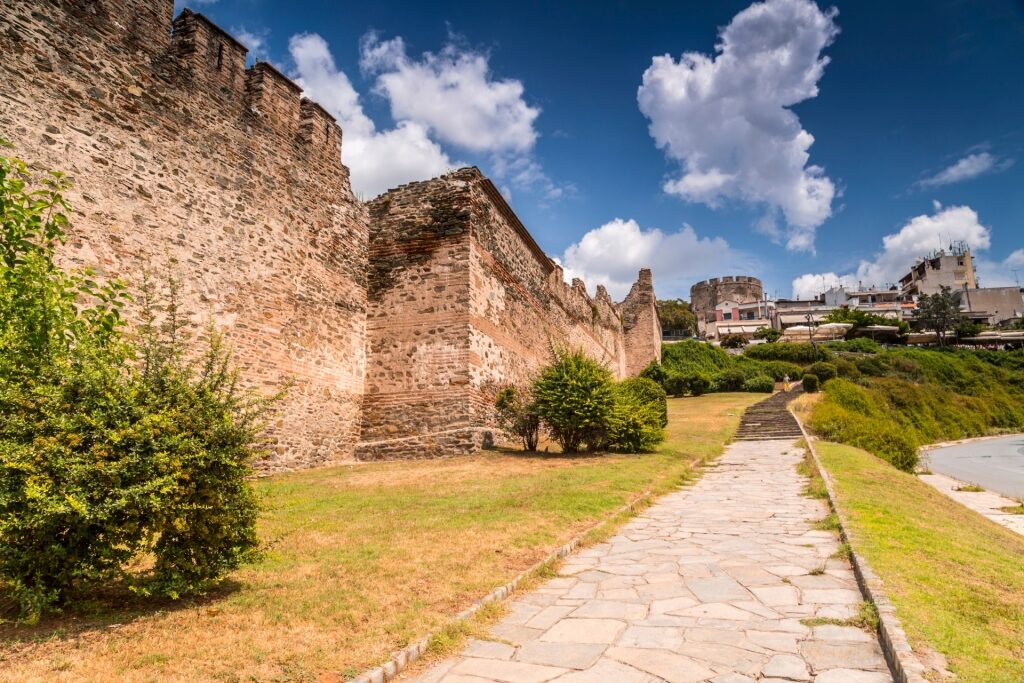
Ano Poli, Thessaloniki
While the capital and the islands may be the big draw, if you’re looking for where to go in Greece for the first time, it’s worth checking out some other mainland hotspots.
The second city of Thessaloniki is a northern powerhouse, steeped in history but thoroughly modern. Head to the Old Town of Ano Poli for hip bars and restaurants hidden behind the city walls and in the traditional houses.
Kavala is another gorgeous northern stronghold. A 90-minute drive from Thessaloniki and a vibrant port city in its own right, it was founded in the seventh century BC and played a significant role during Roman, Byzantine, and medieval times. Each of these has left its own legacy.
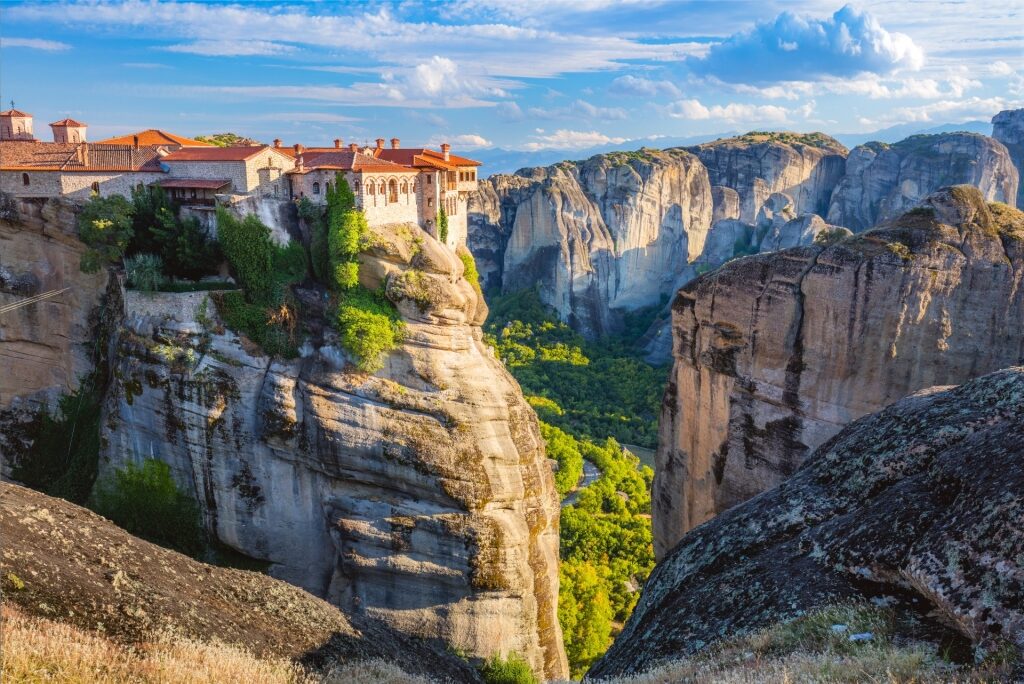
Meteora
Volos opens up central Greece to visitors: climb Mount Pelion for gorgeous villages and incredible sea views, or head to majestic Meteora.
Set on the Plain of Thessaly, it’s known for giant granite rock formations that tower hundreds of feet above the plains. Monasteries built by monks in the Middle Ages perch on top of the rocks.
Don’t forget the town of Katakolon on the three-pronged Peloponnese peninsula. It’s the gateway to magnificent ancient ruins at Olympia.
No One Does Hospitality Like the Greeks
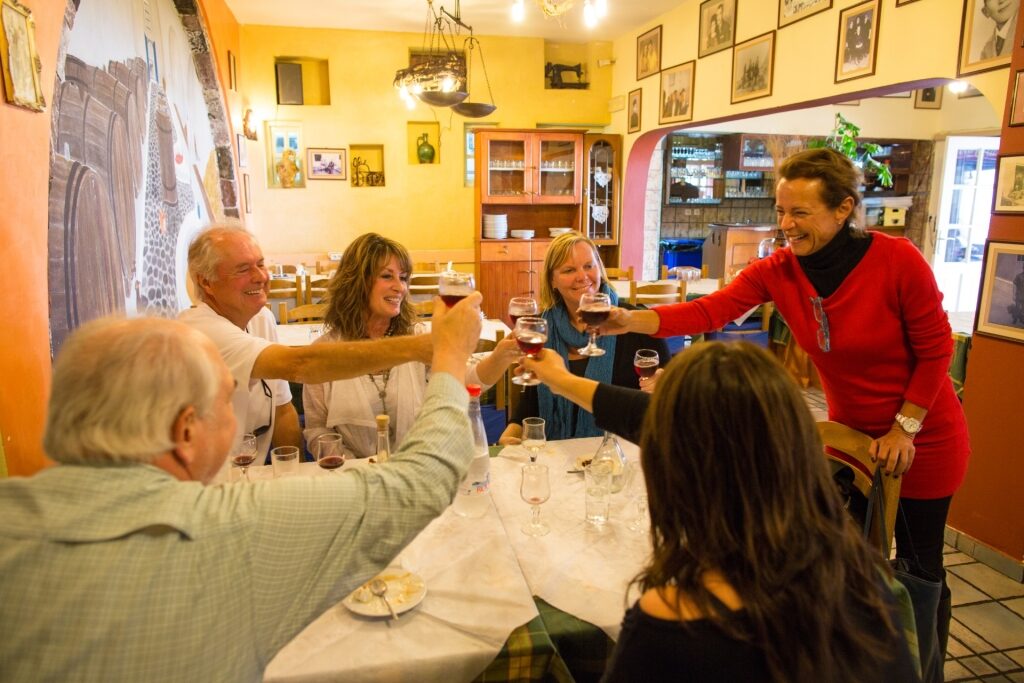
Restaurant in Santorini
For those visiting Greece for the first time, the hospitality of locals can be distinctly disarming. The reason the Greeks are so good at philoxenia, which means “guest-friendship”, is that they’ve been practicing the concept since ancient times.
Back then, hospitality was considered both a moral and political obligation, as well as something that would curry favor with the Gods. Don’t be surprised to be treated like a family member within minutes of meeting someone.
Shopkeepers will often offer those browsing a coffee or a sweet treat. Restaurants will surprise guests with a plate of post-meal fruit platter that’s not been ordered, and various preserves may be given as a parting gift.
Drink in the History
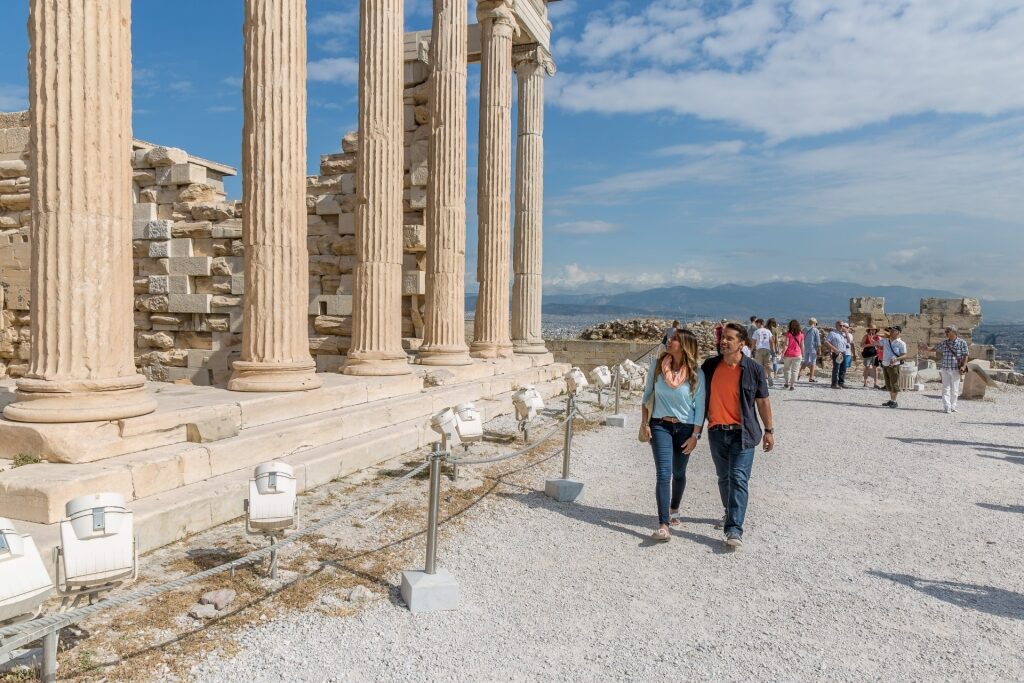
Acropolis, Athens
If you’re visiting Greece for the first time, don’t miss out on the opportunity to take in the country’s long, impressive history. A visit to Greece is quite literally like taking a walk in the cradle of modern democracy. Ancient sites that have shaped much of how we live today are, seemingly, on every corner.
Athens, of course, is simply laden with them: the Acropolis, the stunning Herodes Atticus theater, Ancient Agora, and Kalimarmaro stadium are all just a few minutes’ walk from each other.
In Thessaloniki, there’s the Roman Forum, the Hippodrome, and the Byzantine Baths, while Kavala allows you to visit Philippi. This ancient city features in the stories of both Alexander the Great, and the aftermath of Julius Caesar’s reign as Roman Emperor.
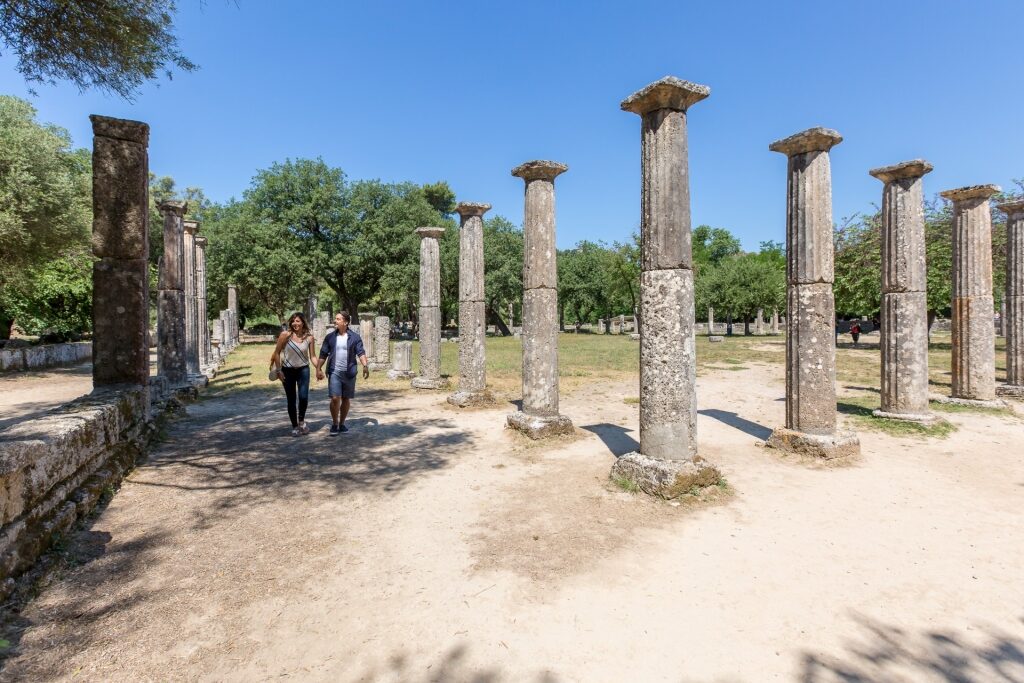
Archaeological Site of Olympia
Ancient Olympia, meanwhile, played host to the original Olympic Games, dating from as far back as the eighth century BC. Today it stands as one of Greece’s most treasured ancient sites.
Siesta Time Is Sacred
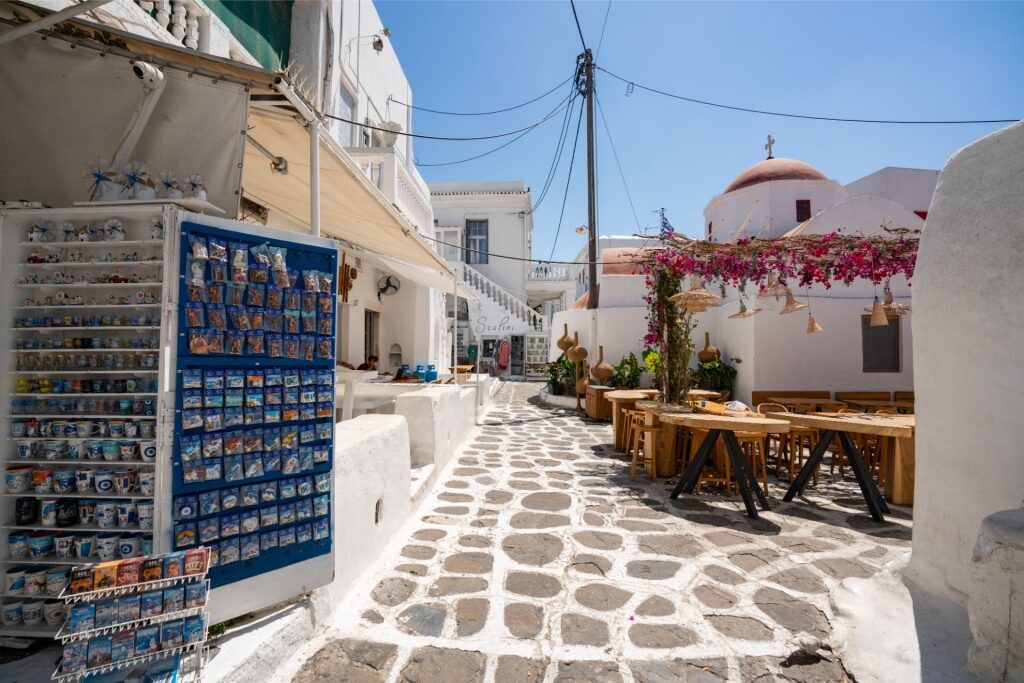
Mykonos
Make any kind of noise between 2 pm and 5 pm during most of the year, and you’ll likely hear the word “mesimeri”, or afternoon ringing loud from the surrounding homes. Greece has quite rigid “hours of common quiet”, and while most destinations have some kind of nighttime noise abatement rules, those three hours in the afternoon in Greece are sacred.
Shops tend to have split opening hours to cater for this mid-afternoon rest period. Restaurants will be much quieter, and service much slower, at this time, and generally little gets done until people rise from their slumber and head out for their evening “volta”, or walk. While this traditionally was taken literally, these days it tends to be a short stroll followed by a very long coffee stop.
Sample Super-Hip Modern Athens
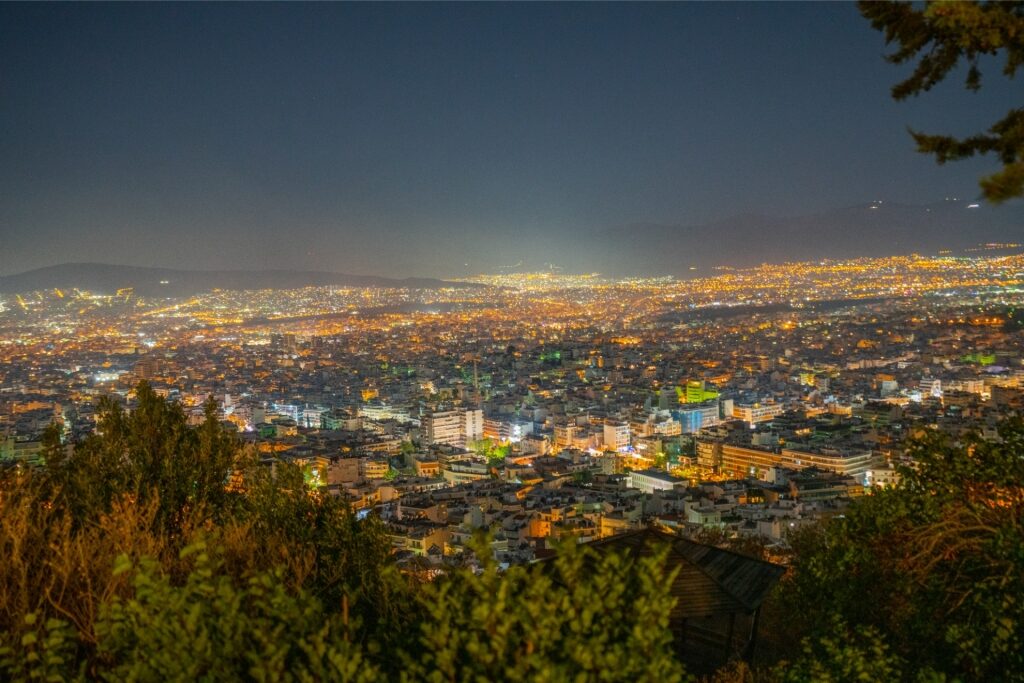
Athens
Visiting Greece for the first time may come as quite the shock if your image of the country includes plate smashing, men dancing with linked arms, and brides with money pinned to their wedding gowns.
Modern Greece, and especially Athens, is incredibly cultured, and many young people turn their noses up at the kind of stereotypes seen in Hollywood films.
Instead, take a walk around the coolest neighborhoods in Athens, such as Psiri and Thisseio, and you’ll find cutting-edge dining, arthouse cinemas, and trendy galleries. Look out for hip bars such as Baba au Rum on Klitiou Street, for some of the best cocktails in Europe, and the Kennedy wine bar on Nikiou Street.
Riding the zeitgeist for modern, cool wine bars, you’ll find sulfite-free wines backed with eclectic tunes from in-house DJs.
Stay Cool in the Heat
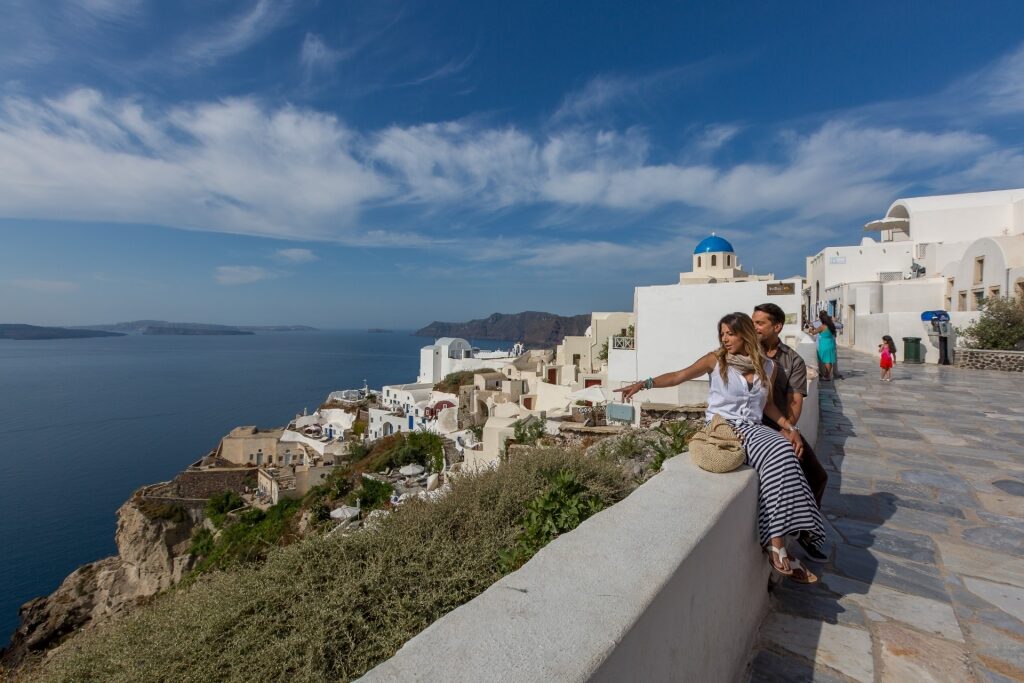
Oia, Santorini
One of the reasons siestas are so prevalent here is that in summer, temperatures can be blisteringly hot. So fierce, in fact, that many visiting Greece for the first time can be caught out.
So be as prepared as you can. When thinking about what to pack for Greece, be sure to include a hat or headscarf for the hottest parts of the day and a pair of comfortable shoes for exploring. Carrying plenty of water to stay hydrated is another recommendation.
In most places, kiosks—small, box-like stores selling everything from cigarettes to ice cream—are abundant, so always take the opportunity to stock up if running low.
Make Sure to Visit a Church
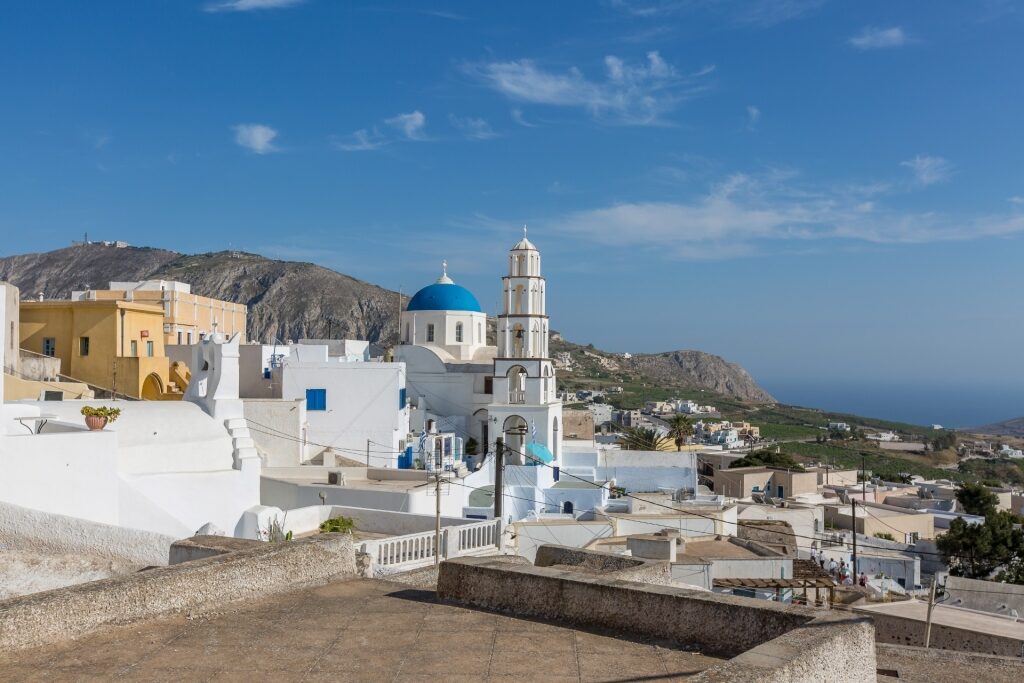
Pyrgos, Santorini
Religion is a big deal in Greece, with the church and state linked via the country’s constitution and 90 percent of the population identifying as Greek Orthodox. That doesn’t mean they are necessarily habitual weekly churchgoers, but it does mean that religion plays a massive role in Greek life.
Attending church for major celebrations such as Christmas, Orthodox Easter, which is a very special time in Greece, and the “name days” of the major saints is a given.
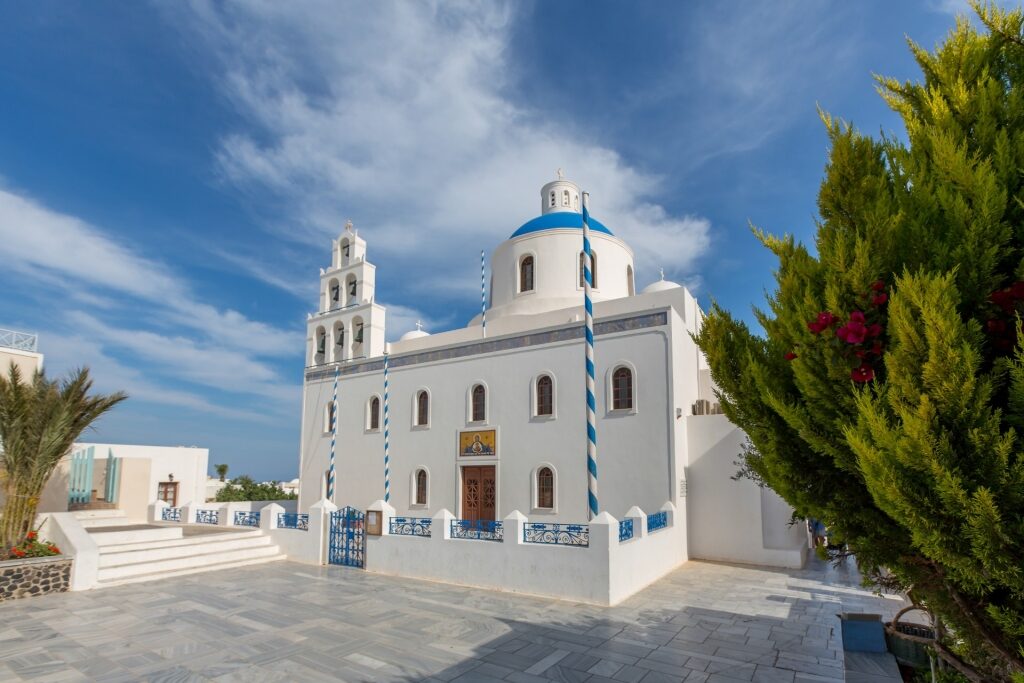
Oia, Santorini
At times, it can feel as though there’s a church on every corner—on Santorini for instance, there’s a church for every 20 people living there.
From the tiniest chapel to the Metropolitan Cathedral of Athens, the interiors of Greece’s churches can be mightily impressive with ornate icons, glistening chandeliers, and flickering candles.
Take time to step inside one to appreciate the atmosphere, remembering that shoulders and knees should be covered to show the appropriate amount of respect.
Sample Greece’s Other “Religions”
There are two other things Greeks approach with almost religious fervor: soccer and coffee. The fierce rivalries between Greece’s most successful teams raise fans’ temperatures to new levels when there’s a big game on.
Even smaller matches in obscure tournaments will see people crowd around a TV in the corner of a café, shouting and gesticulating at on-screen events as they unfold.
Catch a match live if you can, especially if Athenian teams AEK Athens, Olympiakos, and Panathinaikos, or PAOK from Thessaloniki are in town. Alternatively, head to a café to join that TV throng.
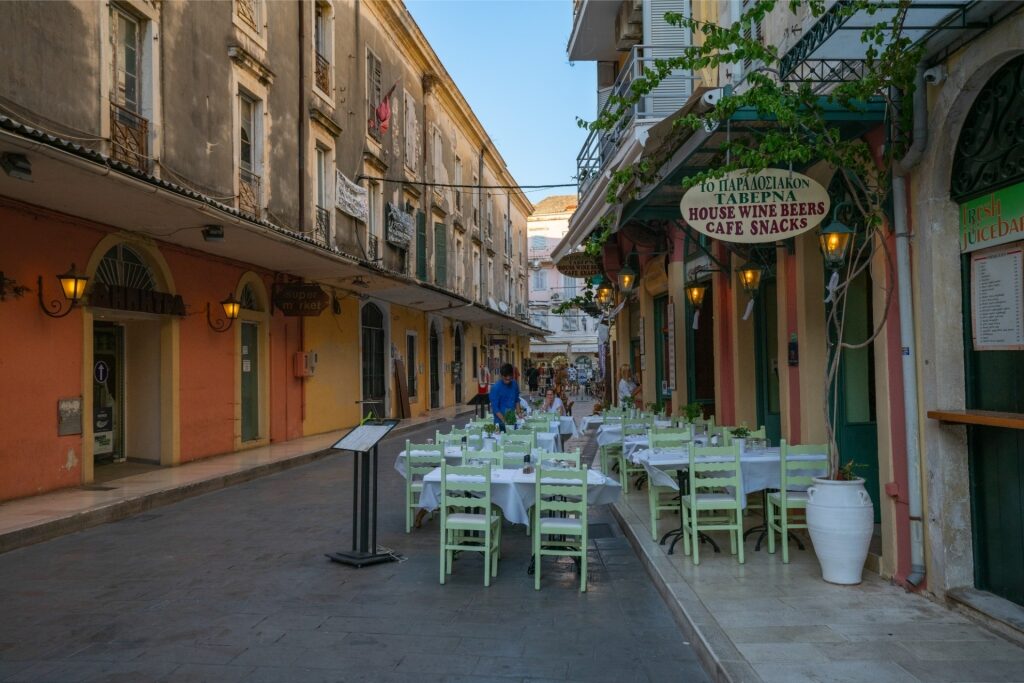
Cafe in Greece
Those self-same cafés are where Greeks indulge in their other favorite sport: coffee drinking. Greeks will literally take hours over a coffee, chatting and putting the world to rights, and people-watching at the same time.
There’s a bewildering choice of coffee on offer, both hot and cold. Ask your server for advice or simply check out the drinks of other patrons.
Get Ready to Party
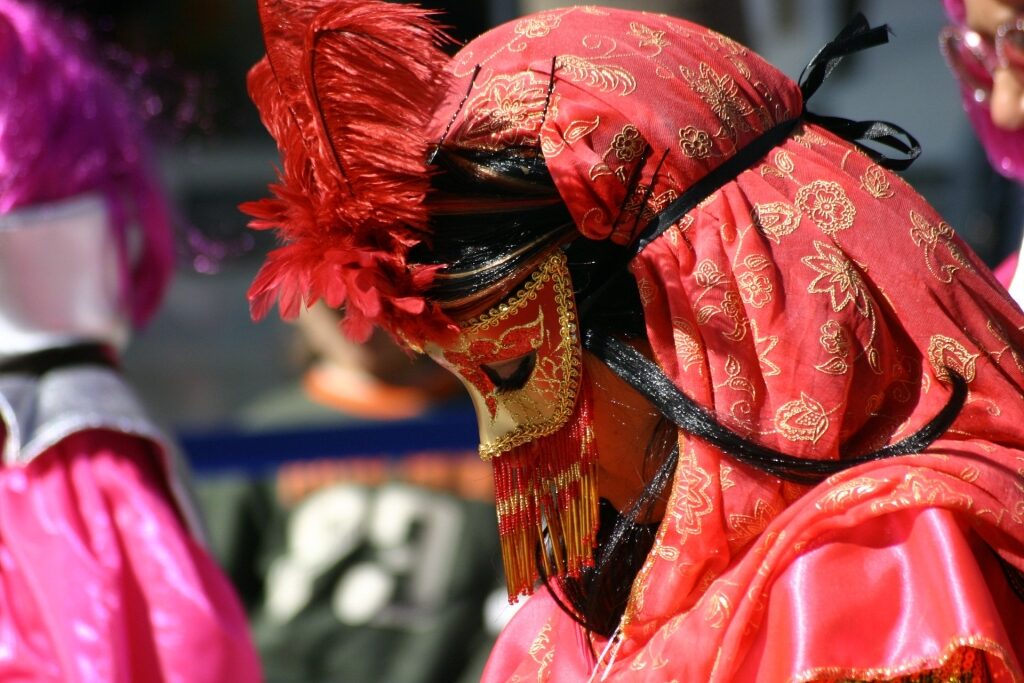
Carnival
Greece loves a celebration—and not just Christmas, New Year, or even the country’s biggest holiday, Easter.
The party spirit runs all year long, starting in February with Carnival. Known as Apokries, literally “abstention from meat”, this pre-Lent festival is a riot of fun, with parades, costumes, private parties, and playful antics.
Beyond birthdays, Greeks celebrate name days, honoring the saint they’re named after. It’s like a second birthday—and can be marked with street fairs, feasts, and festivities, especially in towns and villages with churches dedicated to that saint.
On top of all this, there are a number of national holidays to factor in. Independence Day on March 25th and Oxi Day, October 28th, are two major national celebrations. These honor Greece’s independence and its bold refusal to join the Axis Powers in WWII respectively.
On November 17th, the country commemorates the student uprising against the military dictatorship of the 1960s and ‘70s.
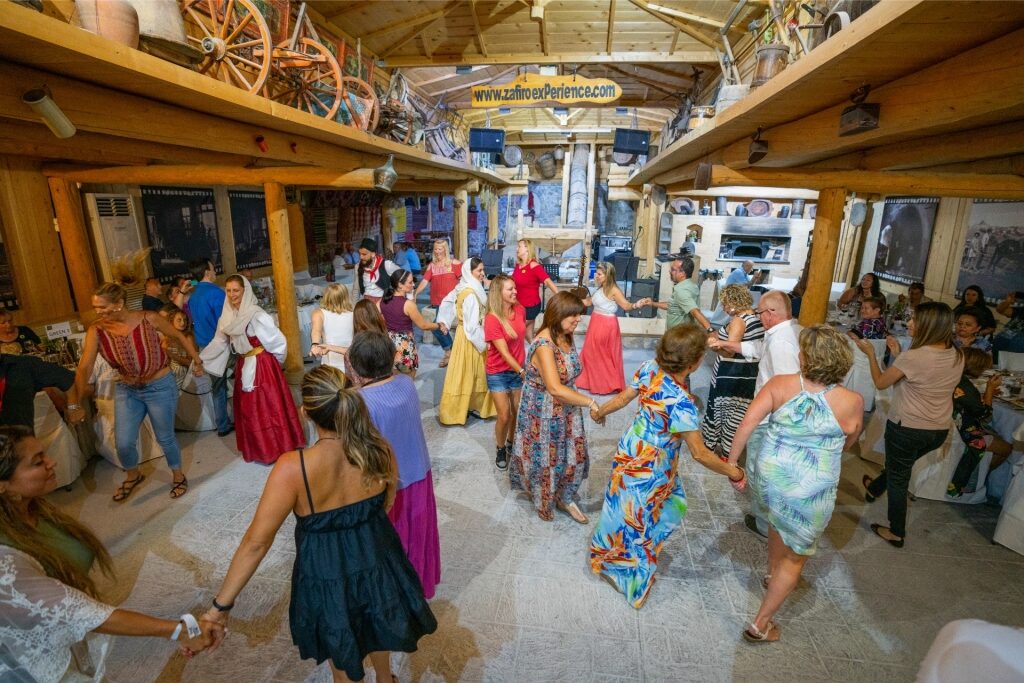
Athens
Add in countless village panigiria, which are traditional festivals, local fairs, and spontaneous gatherings, and it’s fair to say there will be a party waiting for you when you visit Greece.
Read: Expert Tips for Planning a Trip to Greece
Be Prepared for Long Meals
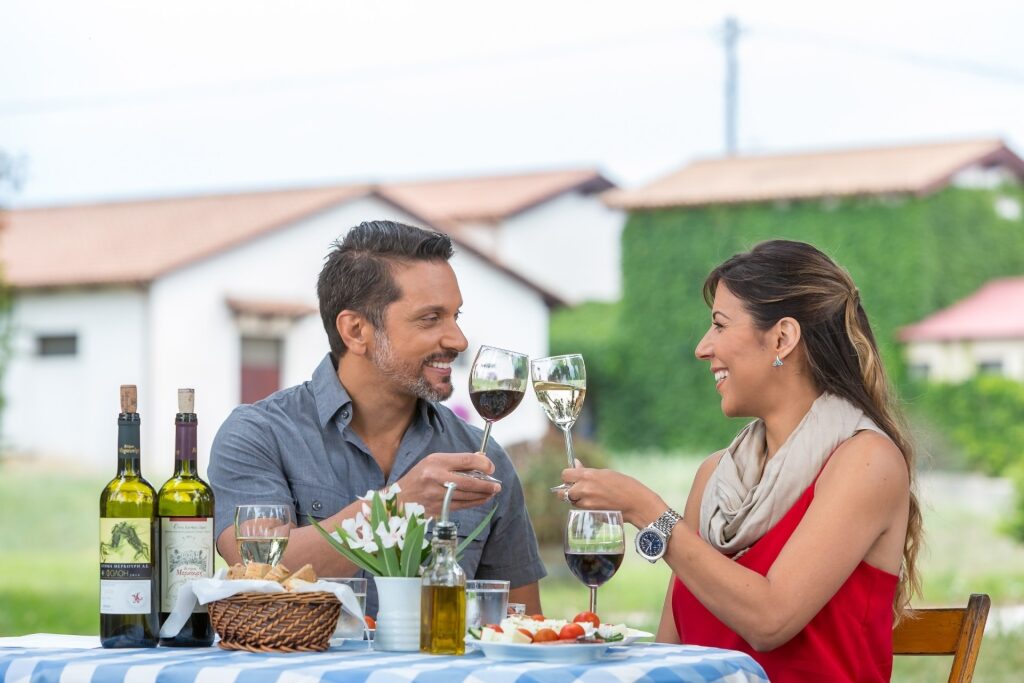
Katakolon
The Slow Food movement may have originated in Italy, but Greeks have been taking their time over meals for centuries, preferring to use the time as a communal gathering rather than simply as an excuse for nourishment.
In traditional tavernas, food is always cooked from scratch using locally sourced ingredients. This lets flavors speak for themselves in a series of simple, yet super tasty dishes.
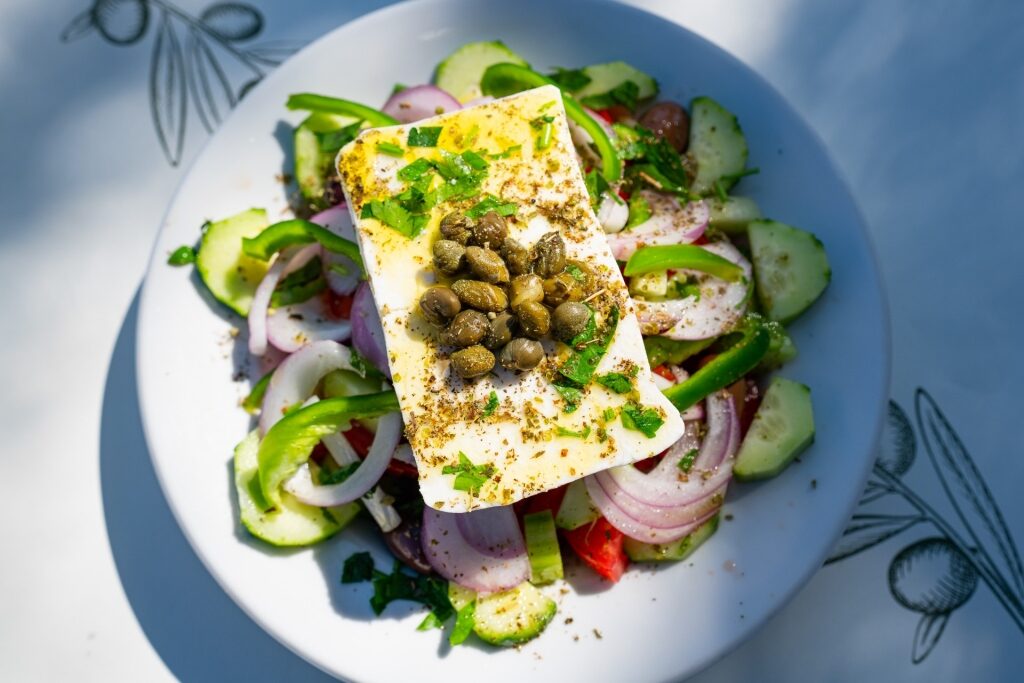
Greek salad
Meals usually start with small plates, or “meze” as they are known. Cold dishes can include tzatziki, a yogurt, garlic, and cucumber dip, various salads, slabs of salty feta cheese, and sautéed mountain greens.
Warm meze include dishes such as saganaki, or fried cheese, zucchini balls, and spinach pie. For most of us, that would be enough, but in Greece, that’s just the appetizers. So, leave room for a variety of grilled meats or seafood, or slow-cooked oven dishes such as moussaka.
All these can then be washed down with either home-produced wine, beers, or ouzo.
Keep Cash Handy
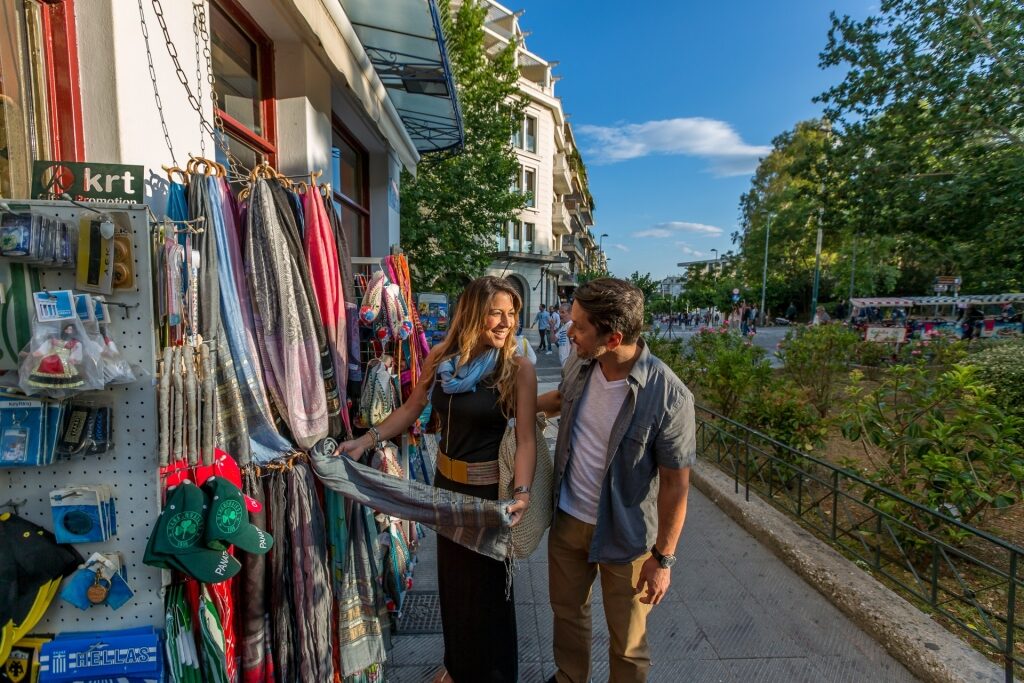
Plaka, Athens
In the major Greek cities, banks are like churches and kiosks—there’s one on every corner—and all major outlets will have credit/debit card machines.
But when venturing to the islands, lack of infrastructure and slow connection speeds can mean paying for things is a challenge if you’re using plastic. As such, it’s always worth having small amounts of cash in your wallet or purse in case needs arise.
This also helps when it comes to tipping in Greece, which is welcomed for good service. Don’t add a tip to the check that you’re paying electronically; it’s better to leave 10 percent in cash.
Appreciate Greek Communication Skills
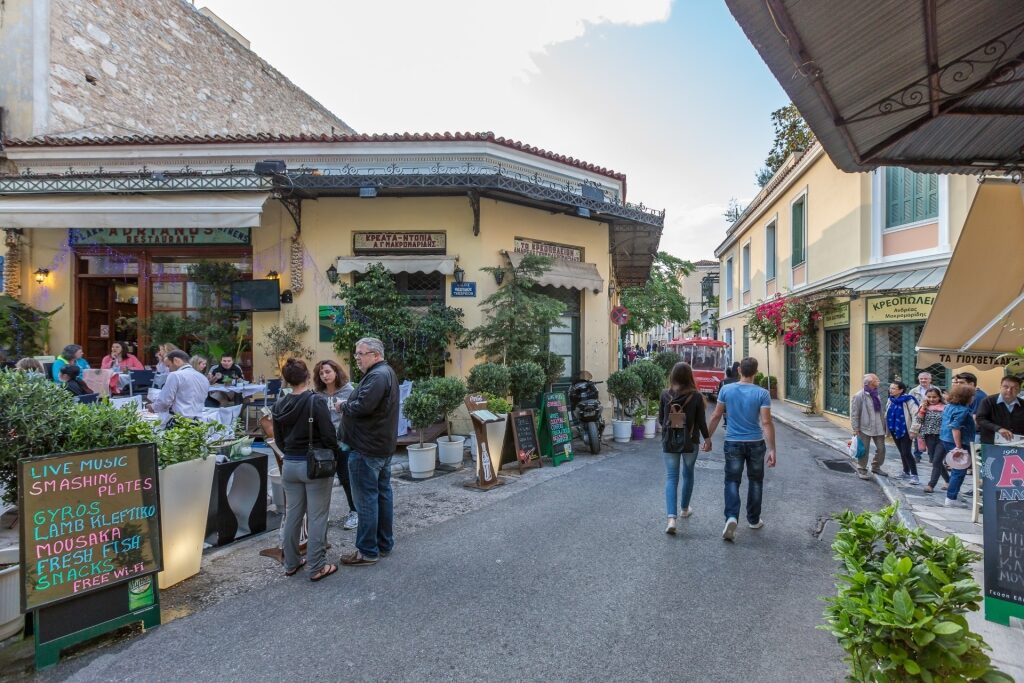
Plaka, Athens
The Greek people are naturally exuberant and what can seem like an argument to others—loud voices and lots of gesticulating—is often just two friends having a lively chat.
Greeks also have their own sign language. A raised eyebrow means “no”, a twist of the hand from a taxi driver means “where are you going”, and a chopping motion with your hand indicates the direction you want to go.
Make sure not to do a conventional flat-handed, open-fingered wave, especially with any force in the gesture. It may be confused for a “mountza”, which is considered the worst kind of insult here.
Finally, learning a few Greek words can really help endear one to the locals. “Nai”, which means yes, “oxi”, for no, and “efharisto”—thank you—are bare minimums you should try to remember.
Read: Best Things to Do in Greece
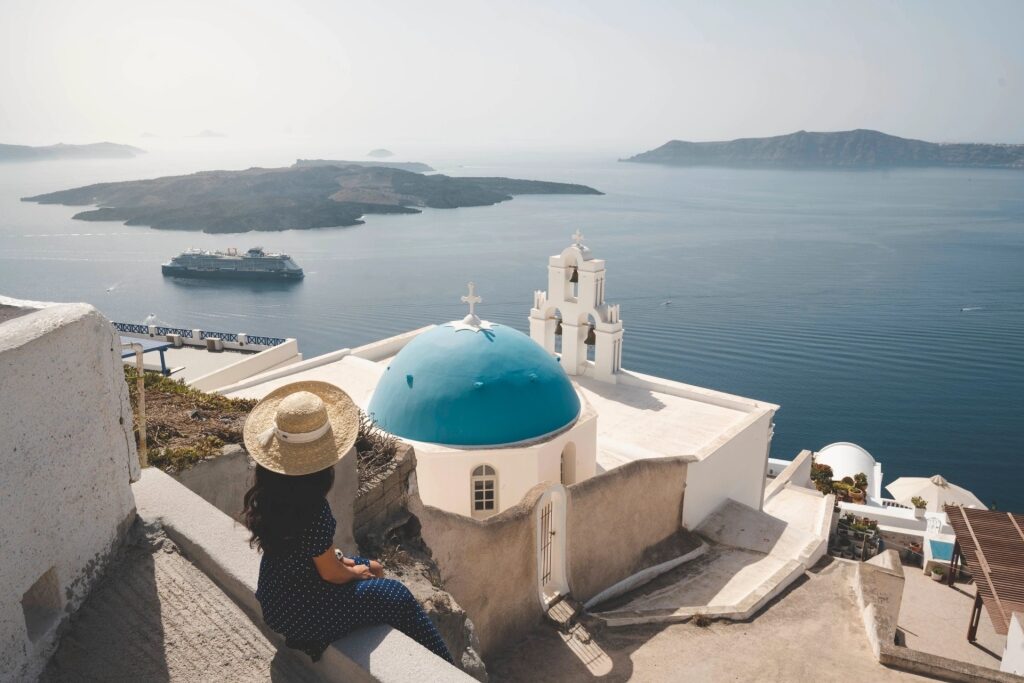
Santorini
Enjoy your personal odyssey on one of Celebrity’s many cruises to Greece. Browse itineraries and plan your next visit to this beguiling country.
